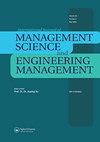An enhanced two phase estimation of distribution algorithm for solving scheduling problem
IF 3
Q2 OPERATIONS RESEARCH & MANAGEMENT SCIENCE
International Journal of Management Science and Engineering Management
Pub Date : 2022-06-07
DOI:10.1080/17509653.2022.2085205
引用次数: 1
Abstract
ABSTRACT Scheduling is one critical issue both in the field of industry engineering and combinatorial optimization research. In order to solve multi-objective scheduling problem with uncertainty, this paper presents a method of enhanced hybrid Estimation of Distribution Algorithm (EDA) with Teaching and Learning-Based Optimization Algorithm (TLBO). First, in order to concentrate their respective advantages, two algorithms of EDA and TLBO are integrated to enhance the capability of both global and local search. Second, scenario-based simulation is adopted to deal with uncertainty, and an adaptive sampling strategy is involved to dynamically adjust the number of scenarios during the evolving process. Third, a problem-specific local search is designed to further improve the optimality of candidate solutions. By comparing with existing algorithms on the benchmark problems of flexible job shop scheduling problem (FJSP), it is to demonstrate that our proposal can obtain better solutions in the aspects of optimality and computational efficiency.求解调度问题的一种改进的两阶段分布估计算法
摘要调度是工业工程和组合优化研究领域的一个关键问题。为了解决具有不确定性的多目标调度问题,本文提出了一种改进的分布估计算法(EDA)与基于教学的优化算法(TLBO)的混合估计方法。首先,为了集中各自的优势,将EDA和TLBO两种算法相结合,增强了全局搜索和局部搜索的能力。其次,采用基于场景的模拟来处理不确定性,并采用自适应采样策略来动态调整进化过程中的场景数量。第三,设计了一个特定于问题的局部搜索,以进一步提高候选解的最优性。通过与现有的柔性车间调度基准问题算法的比较,证明了我们的算法在最优性和计算效率方面可以获得更好的解。
本文章由计算机程序翻译,如有差异,请以英文原文为准。
求助全文
约1分钟内获得全文
求助全文
来源期刊

International Journal of Management Science and Engineering Management
OPERATIONS RESEARCH & MANAGEMENT SCIENCE-
CiteScore
8.50
自引率
33.30%
发文量
40
期刊介绍:
International Journal of Management Science and Engineering Management (IJMSEM) is a peer-reviewed quarterly journal that provides an international forum for researchers and practitioners of management science and engineering management. The journal focuses on identifying problems in the field, and using innovative management theories and new management methods to provide solutions. IJMSEM is committed to providing a platform for researchers and practitioners of management science and engineering management to share experiences and communicate ideas. Articles published in IJMSEM contain fresh information and approaches. They provide key information that will contribute to new scientific inquiries and improve competency, efficiency, and productivity in the field. IJMSEM focuses on the following: 1. identifying Management Science problems in engineering; 2. using management theory and methods to solve above problems innovatively and effectively; 3. developing new management theory and method to the newly emerged management issues in engineering; IJMSEM prefers papers with practical background, clear problem description, understandable physical and mathematical model, physical model with practical significance and theoretical framework, operable algorithm and successful practical applications. IJMSEM also takes into account management papers of original contributions in one or several aspects of these elements.
 求助内容:
求助内容: 应助结果提醒方式:
应助结果提醒方式:


